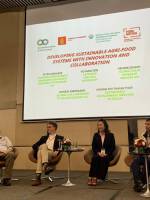
While the commitment to net-zero emissions by 2050 is seen as a challenge for the growth of the Vietnamese economy, it also encourages the sustainable development of many industries, such as construction and plastic recycling.
At the 2021 United Nations Climate Change Conference (COP26), Việt Nam set a target of achieving net-zero emissions by 2050, reducing methane emissions by 30 per cent by 2030, phasing out coal between 2030 and 2040, and preserving forests.
Trần Đình Thiên, a member of the Prime Minister’s Economic Advisory Group, believes that the country needs to accelerate and strengthen the implementation of the green growth strategy to realise these commitments.
However, despite difficulties and challenges, pursuing the goal of achieving net-zero emissions will create pressure to push for the green transition in industries and businesses towards adopting new and clean scientific and technological advancements, the expert said at the conference on “Vision for a green Việt Nam and exemplary stories.”
It will also promote innovation in products, processes, organisation and management models while opening up new markets, restructuring industry markets, and implementing new marketing activities, he added.
Amid the growing trend towards sustainable development, the construction industry is one of the sectors with a need to change, as it emits nearly 40 per cent of the world’s total carbon emissions.
Nguyễn Công Thịnh, deputy director of the Department of Science, Technology and Environment under the Ministry of Construction (MoC), citing data from Eurocham experts at the 2023 Green Economy Forum, said that construction projects account for 39 per cent of energy consumption, 12 per cent of water consumption and about 38 per cent of carbon emissions in Việt Nam.
As a result, the green transition in the construction industry will have a significant positive impact on the process of achieving the net-zero goal.
“Currently, there are many funds, investment projects and enterprises pursuing the energy service company (ESCO) model to support businesses in replacing equipment and renovating infrastructure,” Thịnh said.
“This includes architectural solutions, material solutions, and equipment solutions to ensure energy-efficient usage and effective implementation in construction projects, all towards achieving green criteria.”
Meanwhile, plastic recycling is another industry with bright prospects.
Lê Anh, Sustainability Director at Duy Tân Plastic Recycling, said that the company is the first plastics recycler in Việt Nam to produce recycled PET for beverage bottle production and export to international markets, including the US. In 2022, the company exported 4,000 tonnes of recycled plastic pellets to the US market.
“This development is in line with the global trend,” Lê Anh said.
However, he notes that the products still struggle in the market as they are more expensive than regular plastic bottles.
“We have not made a profit at this moment,” he added.
Therefore, it requires recognition from customers and companies to boost sales of these sustainable products.
The forum also heard that to support enterprises following the green growth approach, banks need to step in to ease the burdens.
“We are creating a set of product standards and policies for businesses with green or sustainable growth goals, especially small and medium-sized enterprises (SMEs), to easily access capital,” said Đinh Ngọc Dũng, deputy director of SHB Corporate Banking Division.
Ly Ly Cao (VNS)




